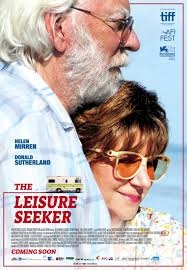Helen Mirren and Donald Sutherland go on a sentimental journey in The Leisure Seeker
Film Reviews Movie Review
Americans are so used to exporting our culture to other countries that it’s always a bit of a novelty to see it reflected back onto us. But for every Paris, Texas there’s a The Leisure Seeker, a generic coming-of-old-age story starring Helen Mirren with a Southern accent and a no-nonsense wig worthy of a Republican state senator. The film marks the English-language debut of Italian director Paolo Virzi, who’s done this sort of thing before in the Crash-esque Human Capital. This particular film is a collection of cutesy “going in style” clichés—old lady on a motorcycle? Check. Senior-citizen oral sex joke? Check.—compiled into a road movie with shades of About Schmidt and Little Miss Sunshine, and a morbid streak that comes in to cut the quirkiness just a little bit too late.
The bitterness in this attempt at bittersweet comes from the Alzheimer’s that leaves retired English professor John Spencer (Donald Sutherland, Canadian) intermittently unable to remember his wife, Ella (Mirren, British). He remembers biographical facts about Ernest Hemingway in great detail, though, prompting Ella to take him on one last road trip from their home in Massachusetts to the Ernest Hemingway Home in Key West in their faithful ’70s RV, which Ella has nicknamed The Leisure Seeker. The chemistry between Mirren and Sutherland—who previously played husband and wife in 1990’s Bethune: The Making Of A Hero—is easy and comfortable, as befits a couple that has been together for more than 40 years. You believe in their love. It’s everything that surrounds it that’s off the mark.
There’s something interesting in the way Ella and John’s adult children, Jane (Janel Moloney) and Will (Christian McKay), infantilize their parents, while Ella still treats John with dignity, allowing him to captain the RV even after he gets pulled over for driving erratically and gently reminding him of their children’s names and ages when he forgets. But this theme would be a lot more powerful if the film itself didn’t portray Ella and John as a pair of graying naifs, overly trusting of strangers and prone to comic bumbling like the scene in which John storms a retirement home with a shotgun, in search of the man he thinks is having an affair with his wife. The gun isn’t loaded, and the man, an ex-boyfriend from decades ago (the late Dick Gregory in his final film role), doesn’t even remember Ella’s name.
In another context, that scene could be a poignant metaphor. But the viewer will have to read that into it themselves, pushing past the saccharine score and cheerfully bright cinematography. Even the painful fact of Ella’s devotion to a man who sometimes mistakes her for someone else manifests on screen as a slideshow she sets up for him at whatever campground they’ve parked at that night, lit with soft white Christmas lights and surrounded by their fellow campers, who gather around on the highly unlikely pretense of being captivated by someone else’s old family photos. Adding to the sense of inconsequentiality is the use of the 2016 election as set dressing, including both a Donald Trump rally and a Hillary Clinton rally for seemingly no other reason but to underline the American-ness of it all. If only the film had something to say about America—or about memory, or about families. As it stands, two screen legends portraying true love will have to do.